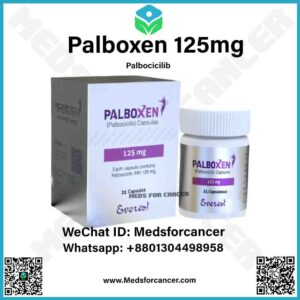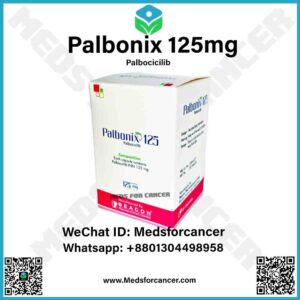Palbocent 125 mg (Palbociclib) | Affordable breast cancer medicine
Generic Name: Palbociclib
Manufacturer: Incepta Pharmaceutical Limited
Capsule: 21’s Pot
Originator: Ibrance by Pfizer
Contact For Order:
WhatsApp & WeChat: +8801304498958
Email: medsforcancerbd@gmail.com
WeChat QR Code

What is Palbocent (Palbociclib) 125 mg?
Palbocent 125 mg (Palbociclib) is a first-line and advanced medication to treat breast cancer in adult patients. It is a tyrosine kinase inhibitor that inhibits HR positive and HER-2 negative advanced breast cancer. It is an effective and widely accepted generic version of palbociclib.
Each capsule contains 125 mg palbociclib. This medication is manufactured and marketed by Everest Pharmaceutical by following all the indications of FDA approved palbociclib. It is cheaper compared to other available brand in the market but worksjust like other brand medications.
Mechanism of Action
This medication works by inhibiting the active kinase in the advanced or metastatic breast cancer. As a tyrosine kinase inhibitor it blocks the cancer cells so that it can not spread to other parts of the body. It also ensures that new cells are not born in the tumor and spreading to the other organs of the body.
Palbociclib 125 mg can be used alone or in combination with other medication according to the doctor prescription and doctors suggestion. It is a alone or combination treatment with other medication to treat advanced breast cancer.
For more information: Palbociclib FDA
How to take Palbocent 125 mg Palbociclib?
Palbociclib is an oral medication for adult patient with breast cancer. The administration of Palbociclib can be different for different patients depending on their health condition, cancer stage and if they have other chronic disease. But in general below dosage and administration is recommended. Do not follow this administration schedule without your doctor’s or health care professional’s permission.
- Take 125 mg of Palbociclib everyday at the same time until disease progression or you doctor ask you to stop.
- You can take the medicine with or without food as your doctor suggest you.
- Make sure you do not miss a dose and you are not taking the medicine at the different time each day.
- If you miss a dose inform your doctor what should you do.
- Do not take double dose if you miss a dose.
- Tell your doctor if you are taking other medicines at the same recommended time for palbocent.
Side effects
Like other medicines Palbocent also has some side effects that can be mild to moderate. But there was no side effects found that can be deadly for patients who have taken this medication so far. If you face any side effects that you seem you can not tolerate contact your doctor immediately. For general purpose you can have a look at below mentioned side effects that are found on field research or informed by the patients.
- You can have allergic reactions like skin rash, itching or irritating skin. But it should be gone after discontinuing the medicine.
- Breathing problem is one of the severe side effects, if you see this going harsh ask your doctor whether you should stop the medicine or not. They may adjust your dose or fully stop the medicine until your side effect is fully gone.
- If it affects in the lung you may face coughing and dizziness.
- You may have low blood count if Palbocent affects your bone marrow and blood producing system.
- There also you may have feelings of nausea, weakness, hair thinning and hair fall, and decrease in appetite.
These were the common side effects found on patients while they were taking this medication. There may have other side effects depending on patient’s health condition and medicine reaction.
What precautions should I take before taking Palbocent 125 mg capsule?
Precautions before taking any medication can save you from lots of unexpected physical condition during treatment. The following precautions you may take before taking Palbocent 125 mg.
- Go through a clinical test of your body if you have any other chronic disease. Or any of your organs is damged where Palbocent can make your health condition worse.
- Tell your doctor about all the medications you are taking right now that can interact.
- Ask your doctor which foods you should avoid. Doctor may tell you to avoid grapefruit and its juice.
- Do not consume alcohol or do not smoke if you are going through this treatment.
- Maintain a healthy and balanced daily routine to get better result. Drink a lot of water and sleep sound, try to take organic food instead of processed food. It will boost your immune system and your body will be more capable to absorb the drug.
- Avoid injuries.
- Ask your doctor for more precautions if you need.
learn more about breast cancer treatment
How much does Palbocent 125 mg cost?
Palbocent 125 mg (Palbociclib) is an affordable generic alternative to branded Palbociclib. It is available in countries such as Vietnam, India, Singapore, Turkey, Saudi Arabia, the USA, Canada, Brazil, Uzbekistan, Kazakhstan, and more. The price typically ranges from $70 to $80 per box, but pricing may vary depending on location and supplier. Contact us for the latest price update.
Where to buy Palbocent 125 mg (palbociclib) online?
Meds for Cancer is a trusted online oncology medicine store where you can buy breast cancer generic medicine at affordable cost. We guarantee you
- 100% genuine medicine.
- Worldwide fast shipping
- Secure payment option
We accept
- Direct bank transfer
- Money exchange
- PayPal
Order Palbociclib generic medicine now online
- WhatsApp: +8801304498958
- E-mail: medsforcancerbd@gmail.com









